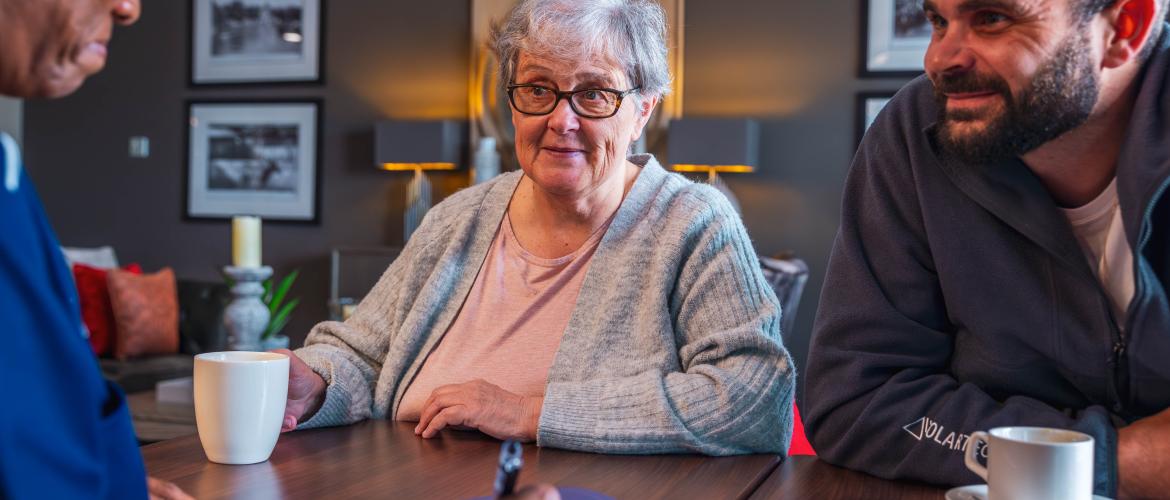
When should a person with dementia stop living alone?
Around 120,000 people with dementia in the UK live alone. Many people living alone with dementia can lead meaningful lives, especially in the early stages with adaptions and support from family and friends.
However, as dementia progresses, people may find day-to-day tasks more difficult to manage by themselves. It's very natural to feel anxious about how someone you care about can live independently, but with the right strategies in place, people living with dementia can live successful lives. It's important to recognise, that there does become a point where a person living alone with dementia may not be able to look after themselves and will require everyday care, from a caregiver or a loved one.
In this article we’ll explore the signs of dementia progression and when it's a good idea to opt for full-time care for a person with dementia.
Recognising the signs of dementia progression:
At the start of a person’s dementia journey, their symptoms will typically be subtle, with symptoms gradually getting worse over time.
Common signs that dementia is getting worse:
- Memory loss
- Confusion
- Language difficulties
- Significant memory problems
Behavioural changes to look out for:
- Agitation
- Agression
- Mood swings
- Wandering
- Withdrawal
Changes in daily routine:
Although experiences of dementia will often vary between individuals, common everyday activities can become increasingly challenging for most people with dementia. Daily life can become affected, and it’ll likely that people require assistance from carers or assistive technology to aid them in carrying out certain activities of daily living that they may have taken for granted. For example, in the early stages of dementia, people may need reminding to wash themselves, and, as the dementia develops, they will need help from others to wash themselves.
What are activities of daily living (ADLs):
Activities of daily living are things we do on a daily basis to stay alive and well.
- Eating
- Bathing
- Dressing
- Toileting
- Transferring/Ambulating
- Managing continence
What are the risks of living alone with dementia?
Living alone with dementia can present some serious risks. It’s important you assess the risks, which will help you evaluate if someone is capable enough to continue living by themselves or time to look for full-time care. Different types of risks of living alone can range from safety challenges, health risks, financial to social risks.
Understanding common concerns of living alone with dementia:
Some safety challenges include:
- Forgetting to lock the doors
- Taking medications incorrectly
- Leaving the hob on
- Getting lost
- Reduced ability to call for help in an emergency
Neglecting health and well-being:
Neglecting health and wellbeing is a characteristic of dementia. It brings about a decreased capacity for self-care. Information processing and memory makes it difficult to grasp when and if you have done certain tasks or activities during the day, such as eating at regular intervals or remembering to clean your teeth.
Deciding when full-time care is necessary:
Choosing to move someone to a care home is definitely not an easy decision. It can evoke a range of positive and negative emotions for people who are affected by dementia. Paying attention to the symptoms that a person is experiencing, and their day-to-day risks and challenges can help you know when full-time care is necessary.
Sometimes, a person living with dementia may resist the idea of living full-time. Granted, when a person is living most of their life independently, it can become anxiety-inducing knowing that they will lose their independence or have to an unfamiliar environment.
Respecting the independence of a person with dementia:
Helping a person with dementia maintain a level of independence is crucial. If you’re supporting and respecting their independence, it can help them maintain a sense of self, boost cognitive thinking skills and have a sense of purpose. Not embracing their independence could make them feel ‘babied’, which will have a negative effect on their mental health. It's important that you balance their independence with safety to ensure they are living the best quality of life.
Prioritising the safety of someone with dementia:
Sometimes, there will be periods when you absolutely need to prioritise the safety of someone with dementia over their independence. They may resist, but it's better to be safe than sorry. For example, it may become necessary to assist them with certain tasks such as managing medications, going outside or cooking. There are ways you can help them to strike a balance between some tasks or activities. For example, modifying the home and adopting assistive technologies to create a safer environment, where they can have a level of independence walking around the house by themselves.
Resources for carers of a person with dementia:
Here are some resources to help you on your journey of caring for someone with dementia:
Help & support for dementia carers